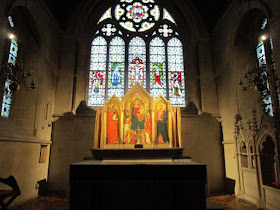Turning up at the polling station on Thursday rehearsing my
internal monologue about the weird sociopathic qualities of the leader of the
Conservative Party, I was confronted with Selma from the Swanvale Halt
congregation, wearing a blue rosette alongside her fellow tellers from the
other parties. Selma lost her husband a couple of years ago and has early-stage
dementia so she can be a bit forgetful. I wasn’t going to say anything rude to
her, was I, or even think anything.
Which is why it’s a struggle to read the LiberFaciorum feeds
of the overwhelming majority of my friends who are unimaginably enraged by the
result of the election. When it was called, I scribbled a scratch forecast of
Parliamentary seats on the back of an envelope, which turned out to be almost
precisely what happened; and you tend be less angry if you’re not caught out. It
strikes me as ironic that the Left has an ideology that declares the equality
and dignity of all human beings, but when any actual human beings disagree with
them in practice, those people become stupid, ignorant and selfish. It’s not a
good position from which to win their votes the next time round: ‘we despise
you, can we count on your support?’ Progressive people also tend to see politics in very moral terms. Electoral success should be a reward for virtue, so if a manifestly unvirtuous person wins an election it's deeply shocking. I am absolutely sure this is an unrealistic approach which underestimates the pragmatic way most people cast their votes, in favour of which political grouping they think will be most practically effective.
I’ve never thought that the media manufactures opinion:
people develop their fragmentary, contradictory, often incoherent and
inarticulate opinions mainly from their own lived experience. Often that experience
is quite narrow, and very few people go out of their way to seek anything beyond
it: they’re too busy, and haven’t the time and mental bandwidth. What
newspapers (and so on) can do is to make articulate what people feel without
necessarily being able to express clearly. So the individual criticisms in the
media of a particular politician (for instance) may be quite unjust, but they can
express an aspect of their character which is true enough: they become untrue symbols of true things, and if they don’t resonate with anything true, they won’t
stick.
I’ve also been struggling with what basically separates people
with progressive views of the world from those who see things from a
conservative perspective. I wonder whether it is at least partly this. A quarter of a
million years ago, we human beings were trying to survive on the steppes of
Africa. Our brains, remember, are still there: that’s where we evolved and
where we remain in our root responses to things. It was tough work and our
basic attitude towards the world would have been insecurity and fear. We didn’t
know where our next meal was coming from or whether what security we had would
be taken from us at any moment. If you manage to survive in this environment,
you can draw two conclusions. Either you have been lucky or skilful. You can
emphasise to yourself the role of circumstances and other people in keeping you
going, or you can focus on your own abilities and aptitudes in securing your
survival. This is nothing to do with actual facts: it’s a story you tell
yourself, a way you interpret your own experience.
As society becomes more complex, this root division over how
far individuals affect their own fate ramifies, and it replicates in the
changed circumstances of history. If you believe that peoples have a lot of
control over what happens to them, you’ll be more inclined to support the
existing social order as it reflects the natural distribution of ability and
effort, and less inclined to take complaints of structural inequality all that seriously.
Conversely, if you see individuals as relatively constrained by their
environment, you will be sceptical of the claims of natural justice and more
likely to accept that people will need help to survive and flourish. Now, most
of us can see the virtue in the other side of this divide whichever one we
mainly fall on, and we appreciate that it’s not all one or the other. Few of us
are so far at either extreme that we could never be attracted by a conservative
or progressive party: there are some who are, but not a huge number. Even less does a person's position on this spectrum infallibly determine how they might vote on particular occasions because so much else feeds into that decision. But the
basic separation, it seems to me, rumbles below almost everything else, two divergent
models of human life.
The point of churches is that we do not, beyond a certain
point, choose our fellow members. We are brought together with people whose
backgrounds and life-experiences should be quite divergent from our own: they
are more like family than freely-chosen friends, although we tend to share more
basic assumptions and attitudes with our families. The people in the pews
around you will fall on different sides of the control-constraint line, and you
might find yourself discovering what your fellow-members in the Body of Christ
feel about things in very discomforting ways.
This morning I found myself praying at the 8am mass for both
those who were excited by the result and those who were anxious about the
future, and lo and behold Marion mentioned the same theme in her sermon at the
10am service. If both of us could come up independently with the same thing, it
is probably limply mainstream, but wet though it might sound, a Christian
community is given no alternative but to attempt to understand everyone who belongs to it.





































